 Petzlover
Petzlover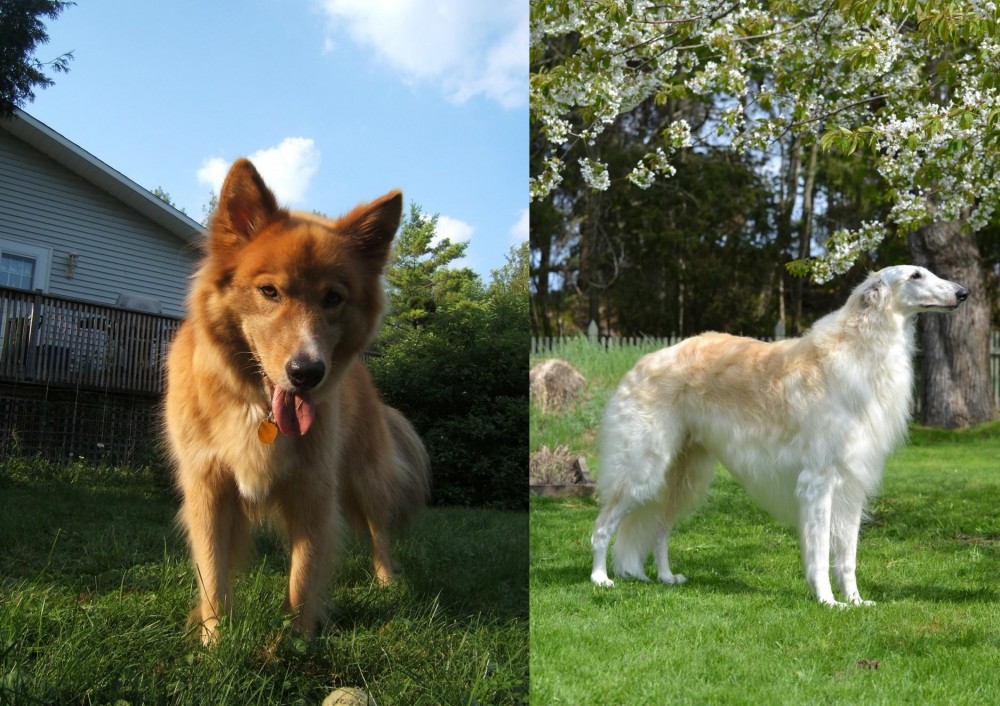 Both Karelo-Finnish Laika and Russian Hound are originated from Russia. Karelo-Finnish Laika may grow 19 cm / 7 inches shorter than Russian Hound. Karelo-Finnish Laika may weigh 31 kg / 68 pounds lesser than Russian Hound. Both Karelo-Finnish Laika and Russian Hound has almost same life span. Both Karelo-Finnish Laika and Russian Hound has almost same litter size. Both Karelo-Finnish Laika and Russian Hound requires Low Maintenance.
Both Karelo-Finnish Laika and Russian Hound are originated from Russia. Karelo-Finnish Laika may grow 19 cm / 7 inches shorter than Russian Hound. Karelo-Finnish Laika may weigh 31 kg / 68 pounds lesser than Russian Hound. Both Karelo-Finnish Laika and Russian Hound has almost same life span. Both Karelo-Finnish Laika and Russian Hound has almost same litter size. Both Karelo-Finnish Laika and Russian Hound requires Low Maintenance.
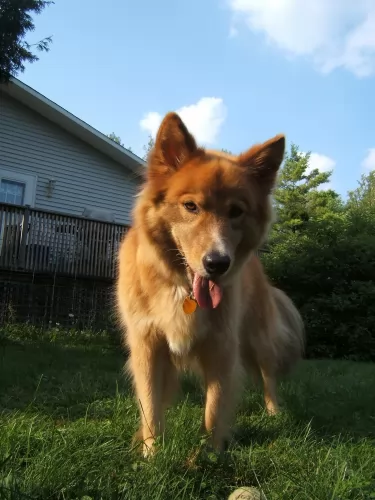 The Karelo Finnish Laika is a Spitz type hunting dog from the Karelia area of Russia.Some people say the dog developed in Sweden. The dog is from a group of ‘Laika’ breeds and has that typical Spitz-type look – the sharpish face, the erect ears and the tail which curls over the back.
The Karelo Finnish Laika is a Spitz type hunting dog from the Karelia area of Russia.Some people say the dog developed in Sweden. The dog is from a group of ‘Laika’ breeds and has that typical Spitz-type look – the sharpish face, the erect ears and the tail which curls over the back.
This attractive dog was developed as a hunting dog, and has a thick, weatherproof coat.The Karelo-Finnish Laika breed developed because people wanted a smaller sized hunting dog that could cope well with the weather, and these Laika dogs matched well.
The breed is ancient – centuries old, and after dying out in numbers during the second world war, the breed was revived when Russians imported Finnish Spitzes from Finland and bred them. The dog is similar to the Finnish Spitz, and in 2006 the Finnish Kennel Club and Russian Kennel Federation included the Karelo-Finnish Laika as a Finnish Spitz breed.
 There are sportsmen and hunters who appreciate the versatile Russian Hound. The Russian Hound has been a popular working breed in its homeland for a long time as it is an ancient dog breed.
There are sportsmen and hunters who appreciate the versatile Russian Hound. The Russian Hound has been a popular working breed in its homeland for a long time as it is an ancient dog breed.
This is an ancient dog breed, being developed by crossing common hunting dogs with indigenous ovcharkas and Laikas. Later European hunting dogs were also introduced into the mix.
The dogs numbers have declined but were later revived in the late 1800s. The first breed standard for the Russian Hound was created in 1896. Known as the Russkaya Gontchaya, this tough dog is still popular in all parts of Russia.
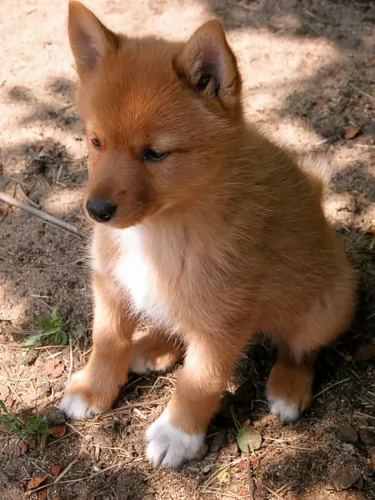 With his wolf-like appearance, the Karelo Finnish Laika is a sharp, intelligent dog and is the smallest Laika in Russia used for hunting. He stands at about 38–48 cm in height and weighs about 11 - 14 kg.
With his wolf-like appearance, the Karelo Finnish Laika is a sharp, intelligent dog and is the smallest Laika in Russia used for hunting. He stands at about 38–48 cm in height and weighs about 11 - 14 kg.
His coat is a reddish color and the fur is fairly long and coarse with a dense, soft undercoat. He looks like a red fox with his sharp, bright face, his erect ears, black nose and bushy tail which curls over the back.
The Karelo-Finnish Laika is a sweet dog with a quiet character. Whenever you suggest a game for him, he throws his docile side to the wind and becomes highly energetic and animated. He is an active dog and loves nothing more than a game with his human family members.
He is mistrustful of strangers, he tends to bark easily and he is territorial and all these characteristic go towards making him a good watchdog. He is quite prepared to live peacefully alongside other dogs in the home, more so when he has been trained and socialized.
He makes a great friend and pet for families and is more than ready to be loving and loyal to his human family.
 The Russian Hound is a medium to large sized dog. He stands at roughly 62 – 67cm in height and weighs roughly 36 to 45kg. The dog however is available in a number of different sizes.
The Russian Hound is a medium to large sized dog. He stands at roughly 62 – 67cm in height and weighs roughly 36 to 45kg. The dog however is available in a number of different sizes.
The coat is fairly short and dense, becoming fuller in Winter. The coat color is fawnish with a darker brown, blackish saddle on the back. The paws have some white markings. The eyes are medium length and the tail is long and held down.
The Russian Hound is a peaceful, calm dog, not making a fuss around strangers, but accepting them well. He may be calm, but he is independent and strong willed.
Training and socialization will be good for him, making him obedient and well mannered.
 Everybody wants a peaceful, loving dog that can be a good pet and companion without causing a lot of trouble. The Russian hound is a peaceful, loving, loyal dog who is going to make any family a wonderful 4-legged fried.
Everybody wants a peaceful, loving dog that can be a good pet and companion without causing a lot of trouble. The Russian hound is a peaceful, loving, loyal dog who is going to make any family a wonderful 4-legged fried.
He can adapt to life in the city or the countryside so long as he is given a good loving home and plenty of exercise.
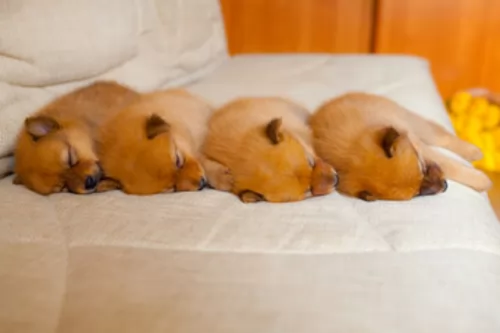 Apart from his good looks, the Karelo-Finnish Laika happens to be a pretty healthy breed and there are no known hereditary health problems with him. Diseases which can affect any dog -
Apart from his good looks, the Karelo-Finnish Laika happens to be a pretty healthy breed and there are no known hereditary health problems with him. Diseases which can affect any dog -
Many large breeds are prone to hip dysplasia. In hip dysplasia, joint problems cause arthritis and pain and eventually lameness. These days, when buying a puppy, people ask breeders about whether the parents were screened for hip dysplasia.
Any dog fed the wrong diet and who isn’t exercised can become overweight. Obesity in dogs is linked to many health problems in dogs. If you’re in doubt about your pet, consult with your vet on the best food for him.
Many dogs are at risk for certain types of cancer, including lymphoma which is cancer of the lymph nodes. When you are brushing your pet, check him for any unusual lumps so that you can catch cancer early.
Dilated cardiomyopathy (DCM) is where the chambers of the heart are stretched out and don't pump blood properly. Sometimes it can go undetected for a while until the dog becomes seriously ill, requiring emergency medical attention. Medications can regulate heart rhythm but there is no cure.
 The Russian Hound is a healthy breed. Nonetheless even the healthiest dog breeds can become ill.
The Russian Hound is a healthy breed. Nonetheless even the healthiest dog breeds can become ill.
Good food, exercise and lots of love and attention can ensure a long life for him.
However every dog can have one of the many common dog illnesses there are. Toothache can be a serious problem for your pet because if you don’t look in his mouth you won’t be able to tell if he has a bad, painful tooth.
Dogs can also break their teeth, causing sharp, jutting pieces which cut the gums. They can also get gum disease. Plaque can cause a whole lot of bacteria in your pets mouth. With the increase in bacteria, your dog’s health problems increase too. It is imperative to look in your pets mouth and speak to your vet about canine dental maintenance.
Eye infection are a common problem with dogs, and an eye infection can be from allergies. Yellow pus can indicate an infection. It is best to speak to your vet because some eye infections can lead to blindness if left untreated.
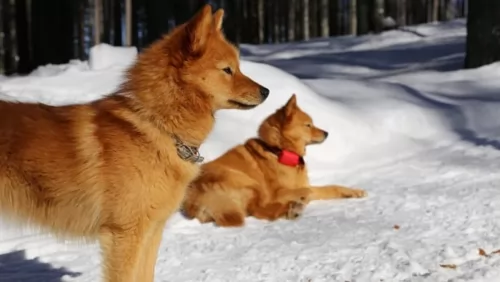 The Karelo-Finnish Laika is a most attractive looking dog and his thick, double coat will need to be brushed at least twice a week to keep it free from dust, grass and burrs. He sheds throughout the year so this brushing will keep the loose dog hair under control.
The Karelo-Finnish Laika is a most attractive looking dog and his thick, double coat will need to be brushed at least twice a week to keep it free from dust, grass and burrs. He sheds throughout the year so this brushing will keep the loose dog hair under control.
Watch your Karelo-Finnish Laika’s diet as a lean, mean dog can live longer than one who is overfed. Dogs which are overweight are likely to develop joint problems and heart disease.
The quality of food you feed your pet is hugely important. Popping chocolates and peanuts into his mouth because you love him so much will be toxic for him. Apart from his top quality dry kibble, add in some cooked chicken, rice and vegetables as a tasty treat and mix in a little bit of raw meat also when you can.
Exercise for your Karelo Finnish Laika is a key component to prolonging his life, and he absolutely loves games, walks and action all the way. It will keep him in shape, keep him happy and prolong his life.
 As a hunting dog, you will need to ensure your Russian Hound gets enough exercise. He will love his walks with you but will want to be let off his leash when in the park. He loves the opportunity to run free. Games at home in the garden will also be good for this large dog.
As a hunting dog, you will need to ensure your Russian Hound gets enough exercise. He will love his walks with you but will want to be let off his leash when in the park. He loves the opportunity to run free. Games at home in the garden will also be good for this large dog.
Provide your pet with a nice, warm, dry sleeping area.
Make sure your pet’s vaccines are up to date.
Have your dog neutered or spayed to prevent unplanned puppies.
Groom your Russian Hound by brushing him twice a week.
Check him over for lumps while brushing him.
Check inside his ears for signs of redness.
Trim his nails.
Look at his eyes and make sure they are clear with no signs of discharge.
Check inside the mouth for rotten or bad teeth as this can cause tremendous pain and also cause toxins to get into the bloodstream.
The Russian Hound relies on vitamin and mineral enriched food. The best commercially manufactured dog foods can provide this. These foods are wonderfully convenient. Try not to give your dog dry kibble day after day, but vary it twice a week with some home-made food.
Simply add into one big pot chicken, brown rice or pasta and spinach, sweet potatoes and carrots. This food can all be chopped up and added in to the dry kibble twice a week. It is wonderfully tasty for your your canine friend. Dogs thrive on simple, consistent meals. Ty and add some raw meat to his food occasionally.
Ensure there is always a bowl of fresh, cool water within his reach.